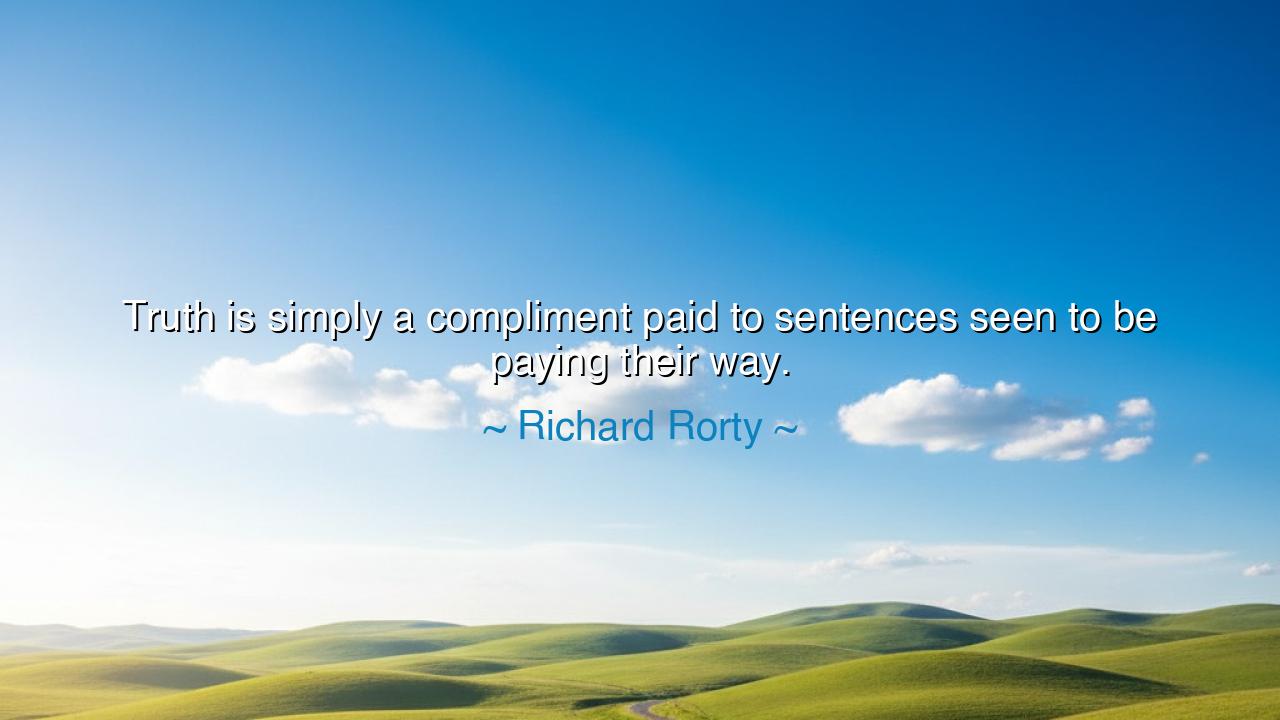
Truth is simply a compliment paid to sentences seen to be paying






Hear, O seekers of wisdom, the paradoxical words of Richard Rorty, the philosopher who dared to unsettle the certainties of his age: “Truth is simply a compliment paid to sentences seen to be paying their way.” At first hearing, this saying sounds strange, even irreverent, as if it sought to diminish the majesty of truth. Yet look deeper, and you shall see that Rorty does not destroy, but clarifies: he reveals that truth is not a jewel fallen from heaven, but a living thing, tested and proved by its use in the world.
What Rorty proclaims is this: words, ideas, and beliefs are not made sacred merely by our declaring them so. They must “pay their way,” which is to say, they must endure the trials of life, they must serve, they must bear fruit. When a sentence guides us well—when it helps us navigate the storms of reality, when it allows us to build, to heal, to endure—then we bestow upon it the noble title of truth. Thus, truth is not a frozen relic; it is an honor granted to that which works, that which proves itself in the great workshop of existence.
Consider the tale of the great mariners of the Age of Discovery. When they set sail upon uncharted waters, they carried maps filled with guesses, half-truths, and errors. But as they voyaged, they tested their charts against the stars, the winds, the shifting of waves. Sentences written in ink upon parchment were either revealed as folly or proven by their guidance to safe harbor. Those that “paid their way” became honored as truth, while others were cast aside. Thus, exploration itself was a living trial of ideas, and truth emerged as the companion of survival and success.
Or think upon the discoveries of Louis Pasteur. For centuries men clung to the belief that disease arose from “bad air” or spontaneous corruption. These sentences were accepted as truth, yet they bore little fruit, and suffering remained. Pasteur, through labor and experiment, offered a new sentence: that unseen microbes cause illness. This idea, at first mocked, proved its worth. It led to vaccines, to sterile surgery, to the saving of countless lives. And thus, by its fruits, his sentence was crowned with the name of truth.
The teaching is plain: truth is not something we inherit fully formed, nor is it preserved in glass, untouchable by life. It is tested in the crucible of practice, and honored only when it strengthens the journey of humanity. To cling to words that do not work is to worship shadows; to grant the name of truth only to what bears fruit is to honor reality itself.
Let this be a guide to your daily path: do not be deceived by lofty phrases, nor dazzled by ideas wrapped in gold. Ask always: does this word, this belief, this sentence “pay its way”? Does it guide me toward justice, clarity, and healing? Or does it wither in the face of reality? Be as the mariner who trusts not the beauty of the map but the way it carries him across the sea.
Therefore, children of tomorrow, let your reverence for truth be bound not to empty dogma but to living wisdom. Test what you are told; measure words against their fruit. And when you find a sentence that sustains, that liberates, that proves its worth through life’s trials, honor it with the sacred compliment of truth. In this way, your understanding will not be brittle like glass, but supple like a tree, rooted in the soil of experience, reaching ever upward to the light.






GHGia Huy
Rorty seems to be redefining truth, not as a final, unchanging concept, but as something that’s granted to ideas that prove themselves useful. It’s an interesting way to look at truth, but does this mean that truth is entirely subjective? Can we ever be certain about anything if truth is simply based on its utility in conversation or society? I wonder how this approach affects our understanding of knowledge and certainty.
QQ.Anh
I find Rorty’s view on truth refreshing, yet somewhat unsettling. It feels more fluid, less rigid than traditional definitions of truth. If truth is about how well something serves its purpose, does that mean it’s always shifting, depending on context? It makes me question how much of what we think of as ‘truth’ is actually just something that fits our current needs or beliefs, rather than something universally fixed.
BTNguyen Bao Tram
Rorty’s quote seems to suggest that truth is more pragmatic than absolute. Truth isn’t some objective fact, but rather, it’s a social validation for ideas that prove their worth through use. This makes me wonder, though, how we can differentiate between truths that have value and those that are simply accepted because they’re convenient. How do we decide which ideas are worth considering and which are just passing fads?
TDHuynh thanh duc
This idea that truth is a compliment to sentences that ‘pay their way’ is thought-provoking. It suggests that truth is less about some inherent, unchanging quality and more about how well ideas function within a given context. But does this imply that what’s true is just what’s accepted at the time? I wonder how this perspective shifts our understanding of truth in fields like science, philosophy, or even everyday life.
DHDuong Hy
Rorty’s quote challenges the traditional notion of truth. Instead of seeing truth as an absolute, he suggests it’s more like a compliment given to statements that have proven useful or effective. It makes me think about how we often accept things as ‘true’ because they fit into our understanding or serve a purpose. But does this mean truth is just a social construct, or is there something deeper at play here?